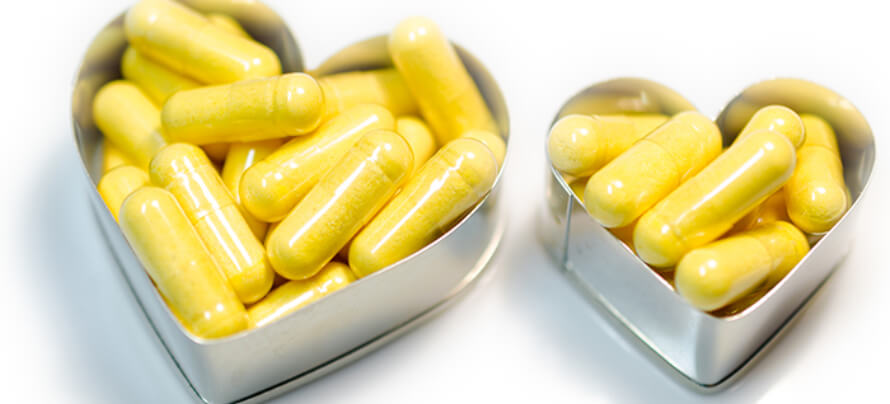Key Takeaways
- CoQ10 is one of the most long standing antioxidant and heart health supplements available on the market.
- CoQ10 is most definitely overhyped, with more claims of efficacy than true benefits, so supplementation is not as beneficial as most people think. However, it can still be useful.
- CoQ10 supplementation can be used daily but, if you want immediate benefits, it’s best used only in people who had a heart attack before or who are using statins.
Everybody has a “trigger” which turns them into a lunatic.
For doctors it might be hearing that “vaccinations don’t work,” for astrophysicists it’s likely being told that their astral sign predicts the future (such a bloody aquarius thing to think), and some chefs would try and shank me if I ordered a steak well done.
For high school biology teachers it seems their trigger is the mitochondria.
Seems like most people have a story where, the first time they learned about cellular structures in high school, their otherwise normal teachers started chanting THE MITOCHONDRIA IS THE POWERHOUSE OF THE CELL and proceed to sacrifice the classroom pet to the dark gods of bioenergetics.
Personally speaking, my professor jumped onto his desk and mimicked shooting a shotgun in an attempt to explain ATP synthase. “IT JUST SHOOTS ELECTRONS LIKE BOOM BOOM BABY” is not what I expected to hear from an otherwise calm and respectable man.
But it worked, and now damn near everybody remembers that THE MITOCHONDRIA IS THE POWERHOUSE OF THE CELL.
Of course, now this has led into anything related to the mitochondria now being related to power and energy production— whether it’s a supplement or a bracelet we see the “powerhouse” mentality come back time and time again.
Which includes Coenzyme Q10, one of the earliest and most popular antioxidant supplements and one of the first “vitamin-like” compounds to hit the market.
Is it all it’s hyped up to be? Will CoQ10 upgrade your mitochondria from coal to cold fusion? Read on to find out.
Table of Contents
+
What Is CoQ10?
Coenzyme Q10 (henceforth CoQ10) is a naturally occurring molecule in our bodies and most well known for being a vital component of our mitochondria.
Mitochondria, or the powerhouses of cells to anybody who took 9th grade biology, are small things in our cells (organelles) that produce the energy required to form ATP. CoQ10 both supports this process and provides antioxidant protection in a mitochondria.
Without CoQ10 we just straight up die.
Thankfully we can synthesize enough of it in our cells to not die!
It’s because of this synthesis and no outright requirement to eat it that it’s not technically called a vitamin—it’s still called a pseudovitamin at times, mostly by me, because not only do I like the name but it also follows general vitamin-like themes.
- If we don’t have it we die.
- We can live with minimal levels, but it isn’t the best situation to be in.
- There is likely an “optimum” level of CoQ10 to support us.
So when it comes to the decision as whether or not to supplement CoQ10 we can either ask ourselves:
- “Am I getting all these pseudovitamin-like benefits I can be and, if not, will eating more CoQ10 help?”
- “Could there be other effects of CoQ10 that are just plain good?”
To narrow these questions down let’s look into why people supplement CoQ10 in the first place, and what types of CoQ10 exist out there for us to supplement.
Why Do People Supplement with CoQ10?

Almost all reasonable CoQ10 claims fall into one of 3 categories:
- It protects your heart
- It serves as an antioxidant inside cells
- It improves mitochondrial health
Let’s look at each.
CoQ10 and Heart Health Benefits
The first group of claims are those pertaining to the heart.
Not circulation, mind you, despite most “heart health” supplements focusing on promoting good circulation. CoQ10 supplementation tends to focus on the heart tissue itself since out of all body organs CoQ10 seems to concentrate here.
A properly functioning heart has to beat a lot and produces a lot of oxidation so, when an antioxidant gathers there, it’s a good indication of importance to the body.
CoQ10 and Antioxidant Benefits
Not all antioxidants are made equal.
While some antioxidants like vitamin C just kinda float around, others like astaxanthin are fat soluble and become a part of cell membranes themselves. Some are a one-and-done type of antioxidant while others, like PQQ, can go through thousands of antioxidant cycles before fatiguing for long-lasting protection.
CoQ10 is a fat soluble antioxidant that, due to it being naturally produced, already has all the machinery needed to be regulated inside a cell. It can get to cells, get in mitochondria, basically everywhere we want it.
So, alongside stuff like vitamin E, CoQ10 is seen as a “default” antioxidant supplement. Nothing overly fancy but it gets the job done and gets it done reliably.
CoQ10 and Mitochondrial Health Benefits
The last category of claims tend to focus around energy production.
These claims tend to be the ones most susceptible to hype. If a mitochondria can “work better” in some manner then it can be hypothesized that these changes lead to increased energy production (which leads some to believe that it helps with muscle gain and fat loss) or promoting longevity.
Recommended Reading:
→ The 3 Best and Worst Anti-Inflammatory Supplements (According to Science)
What Types of CoQ10 Are There?
All the above claims can be applied to the following three forms of supplemental CoQ10:
- Ubiquinone, the most basic and oxidized form of CoQ10.
- Ubiquinol, the slightly more expensive reduced (opposite of oxidized) form of CoQ10.
- MitoQ, which is ubiquinone attached to a molecule (TPP) that helps deliver it to the mitochondria in hopes that it can reach the target more effectively.
For all intents and purposes they are the “basic” form, the “people debate about whether or not the slight price increase is worth the slight theorized benefits to performance” form, and the “god damn this is expensive no thank you” form.
What Are the Benefits of CoQ10?

Unlike most antioxidant supplements, CoQ10 has two very unique and potent benefits.
CoQ10 and Statin Side-Effects
The major benefit of CoQ10 supplementation is when we impair our own production of it and need to replenish our stores.
Statins are a group of pretty much only pharmaceuticals since we don’t have good supplemental statin options. Well, we did, but then the government stole monacolin K (oh sorry, “patented lovastatin”) from red yeast extract and then made it illegal for supplement companies to use the best at-the-time option for reducing cholesterol levels despite it being a natural component.
#notbitter
Statins are pretty good at reducing cholesterol but they have one kinda major side effect. The enzyme they inhibit, HMG-CoA, also synthesizes CoQ10. If you are on statins for too long then you can get various forms of myopathies.
Not a good situation, destroying your muscle tissue from the inside and all that …
Yet completely alleviated when you supplement CoQ10 alongside the statin! The best side-effects are the ones you can avoid in their entirety after all, so in this particular context many people report CoQ10 having nearly curative effects—because they were.
The best usage of CoQ10 is alongside statin drugs. Statins, by virtue of their mechanism, harm CoQ10 synthesis so we should replenish it from outside sources.
CoQ10 and Post-Myocardial Infarction
CoQ10, due to its position in the heart, provides localized antioxidant protection.
However, under most circumstances CoQ10 simply isn’t a strong enough antioxidant to do anything appreciable here. You can increase CoQ10 levels in the heart, sure, and this is theoretically a good thing but the magnitude of benefit is low enough to be hard to prove.
The exception here is “post-myocardial infarction” or in people who already suffered a heart attack. CoQ10 supplementation appears to have fast acting and significant protective effects when given after heart damage.
This is likely due to how a heart attack damages the heart tissue and, when the heart tissue is weaker, heart attacks become more likely. People who suffered a heart attack are at greater risk for subsequent heart attacks compared to controls after all.
As well, CoQ10 may be able to increase exercise capacity in people who have heart complications— a situation where cardiac output seems permanently impaired relative to before the heart attack.
For people who had a heart attack and would rather not have a second one CoQ10 seems to be a very prudent inclusion into your daily supplement routine.
CoQ10 and Antioxidation
CoQ10 is a pretty good antioxidant when tested in isolation.
That doesn’t mean much, of course, since a petri dish isn’t our bodies and many antioxidants either fail in our bodies or otherwise run the risk of turning into a prooxidant. CoQ10 seems to not be associated with either of these, to a concerning degree at least, and can provide protective effects.
Only thing is, not the mitochondria. It seems to be an antioxidant to the red blood cells that carry it throughout the body (en route to the cells) and for the blood overall. Excluding the aforementioned heart issues where antioxidation from CoQ10 occurs in the heart.
This specific area of the body, in the blood, is also where the vast majority of “antioxidant supplements” exert their benefits, sort of like grape seed extract how it can preserve nitric oxide levels through merely being an antioxidant in the right place at the right time.
Unfortunately, while demonstrably a good antioxidant, this specific function is not currently linked to any major therapeutic or preventive benefit. It’s more “technically correct” food for thought.
What Can CoQ10 Not Do?
CoQ10, like most supplements, gets associated with false claims after rising to prominence.
This section will briefly go over the major false claims associated with CoQ10, and one potentially cool function of this supplement that is not yet proven.
CoQ10 and Energy Production
The first major claim of CoQ10 is that pertaining to its role in the mitochondria.
CoQ10 is a vital component and protector of the mitochondria, which has led to some people claiming that it can enhance the efficacy of the mitochondria overall. When the mitochondria is more active, it produces more ATP, which is then theorized to provide more energy.
And, of course, if you use fuel faster then the fuel storages (in this case, adipose tissue) should theoretically be depleted faster. In other words, you lose fat faster. It’s thought that CoQ10 has this one-two punch of giving you more energy while burning fat.
Unfortunately, this is not likely the case.
Adding more CoQ10 into the body doesn’t seem to be able to cause a direct and reliable increase in mitochondrial capacity of otherwise healthy people.
CoQ10 and Longevity
A general rule of thumb, when it comes to dietary supplements, is that anything related to the mitochondria, ATP, telomeres or the process of “senescence” (cellular aging) will inevitably be claimed to increase longevity.
And, due to the nature of longevity, it’s not like we can get a double-blind trial in humans for these claims—that would take at least 50 years to get reasonable data and, by that time, it would be far too late for all of us to “prevent” aging.
Regardless, despite the inherent problems associated with getting good data on this topic, CoQ10 (at least in my view) doesn’t seem overly promising for anti-aging.
While providing antioxidants to the mitochondria are great, in theory, for supporting them in the long run using CoQ10 for this purpose can either be seen as adding fuel to an already full tank (assuming your body synthesizes enough CoQ10, which is usually the case) or just throwing fuel on your window—fuel’s nice and all but it needs to get to the tank.
What Might CoQ10 Do?
One bonus topic just for the take-away:
CoQ10 and Fibromyalgia
I’m adding this section since I can’t put it in the Yes or No categories in good faith but I still want to talk about it.
When it comes to fibromyalgia, and chronic pain disorder, there are understandably very few options (even pharmaceutical) to help with symptoms. CoQ10 has been reported to help on this topic, and I have personally spoken to people who reported benefits with it.
But the science on it is really “meh” right now. One good study noting less headaches in this population of people but beyond that it’s observational and case report studies—it’s evidence, just not gold standard evidence.
And ultimately, “speaking to people who reported benefits” is something that placebo effect can really mess up so this topic is still a crap shoot right now.
All I can say is that, if you have fibromyalgia or chronic pain disorder, perhaps try a cycle of CoQ10 and see if it helps? If it doesn’t help within a month then abandon supplementation since it should have worked a bit by then.
What Is the Clinically Effective Dose of CoQ10?

CoQ10 supplements are usually taken in the range of 90 mg up to 200 mg per day.
It’s hard to determine which is the “best” dose since it isn’t acute dose, but rather how long you take it and how much that stays in your body, that determines benefits.
What Types of Results Can I Expect with CoQ10?
Unfortunately, all proven beneficial effects are ones that are not perceivable in the long term.
The one exception to this is the currently not well proven benefit to fibromyalgia and chronic pain disorder where, if CoQ10 does work, then symptoms would be reduced— uncertain to what magnitude though.
Is CoQ10 Safe?
At this moment in time there are no known side effects with the major forms of CoQ10; ubiquinone and ubiquinol. Lots of research to support that as well, worst side-effect is financial (although the price has gone down a lot this past decade.)
MitoQ, the name for when a ubiquinone molecule is attached to a fat soluble component called TPP (allowing it to reach mitochondria better) isn’t as well studied as the former 2 forms when it comes to safety but has numerous studies on it and nothing really bad has arisen yet— seems safe.
Among dietary supplements CoQ10 is in the category of those that are very safe.
The Bottom Line on the Benefits of CoQ10
Ultimately, CoQ10 is a pretty basic antioxidant supplement with some very potent, but niche, benefits.
It’s just a decent antioxidant that, if it slips into your mouth, yay!
However, no real reason to seek it out unless you’re taking statins or had a heart attack. If you want to go all out on cardiac protection it would be required in your “stack” but otherwise it’s pretty mediocre.
If you’re considering adding CoQ10 to your regimen just for cautionary reasons, or you want to micromanage your health, the best option is to find a multivitamin supplement where a bit of CoQ10 was slipped in for a low price. Oh look at what we have over here in the store, it’s Triumph, what a coincidence!
Triumph contains 35 vitamins, minerals, herbs, and adaptogens to plug nutritional “holes” in your diet, improves your mood and mental and physical performance, and boosts your resistance to stress, sickness, and disease.
If that sounds good to you, then you want to check out Triumph today.
🙂










